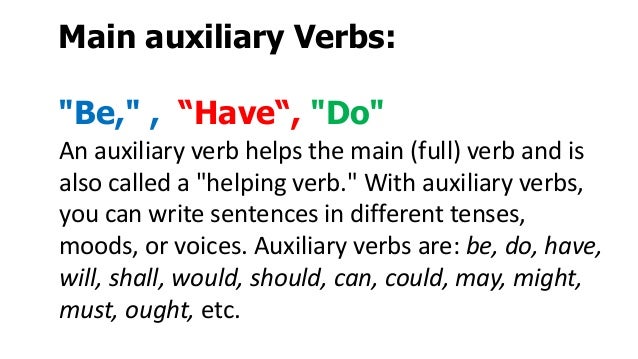https://www.youtube.com/watch?v=b_U39TtQElI

https://www.quickanddirtytips.com/education/grammar/prepositions
http://blogdemiteacher.blogspot.com/2011/02/more-prepositions-4th.html
Prepositions are words which begin prepositional phrases.
A prepositional phrase is a group of words containing a preposition, a noun or pronoun object of the preposition, and any modifiers of the object.
A preposition sits in front of (is “pre-positioned” before) its object.The following words are the most commonly used prepositions:
about
|
below
|
excepting
|
off
|
toward
|
above
|
beneath
|
for
|
on
|
under
|
across
|
beside(s)
|
from
|
onto
|
underneath
|
after
|
between
|
in
|
out
|
until
|
against
|
beyond
|
in front of
|
outside
|
up
|
along
|
but
|
inside
|
over
|
upon
|
among
|
by
|
in spite of
|
past
|
up to
|
around
|
concerning
|
instead of
|
regarding
|
with
|
at
|
despite
|
into
|
since
|
within
|
because of
|
down
|
like
|
through
|
without
|
before
|
during
|
near
|
throughout
|
with regard to
|
behind
|
except
|
of
|
to
|
with respect to
|
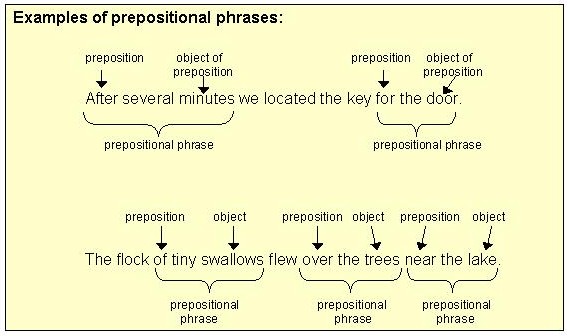
It is useful to locate prepositional phrases in sentences since any noun or pronoun within the prepositional phrase must be the preposition’s object and, therefore, cannot be misidentified as a verb’s direct object.
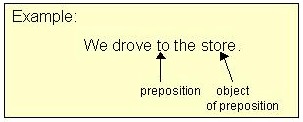
To the store is a prepositional phrase.
Store is the object of the preposition to, not the direct object of the verb drove.
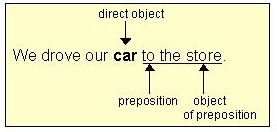
Car is the direct object of the verb drove.
To the grocery store is a prepositional phrase.
NOTE:
A word that looks like a preposition but is actually part of a verb is called a particle.

Held up is a verb meaning “to rob.”
Therefore, up is not a preposition, and bank is not the object of a preposition.
Instead, bank is the direct object of the verb held up.
To avoid confusing prepositions with particles, test by moving the word (up) and words following it to the front of the sentence:
Up the bank four armed men held.
If the resulting sentence does not make sense, then the word belongs with the verb and is a particle, not a preposition.
Note the difference:
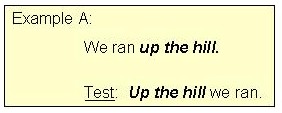
The resulting sentence makes sense. Therefore, up is a preposition.
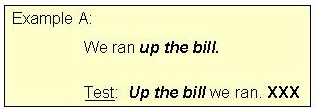
The resulting sentence does not make sense. Therefore, up is a particle in this sentence.
The following examples illustrate the difference between prepositions and particles:
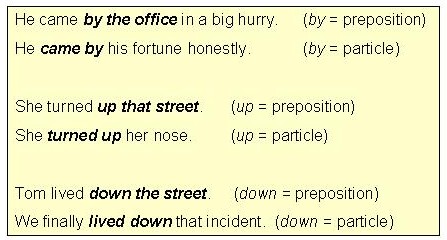
https://webapps.towson.edu/ows/prepositions.htm

https://northseaenglish.com/prepositions-made-easy-preposition-definitions-for-location-and-movement/
Examples of Prepositions
In the following sentences, examples of prepositions have been italicized. As you read, consider how using different prepositions or even different types of prepositions in place of the examples might change the relationship between the rest of the words in the sentence.
I prefer to read in the library.
He climbed up the ladder to get into the attic.
Please sign your name on the dotted line after you read the contract.
Go down the stairs and through the door.
He swam across the pool.
Take your brother with you.
Types of Prepositions
There are three types of prepositions, including time prepositions, place prepositions, and direction prepositions.
Time prepositions are those such as before, after, during, and until; place prepositions are those indicating position, such as around, between, and against; and direction prepositions are those indicative of direction, such as across, up, and down. Each type of preposition is important.
Time prepositions are those such as before, after, during, and until; place prepositions are those indicating position, such as around, between, and against; and direction prepositions are those indicative of direction, such as across, up, and down. Each type of preposition is important.
Preposition Exercises
The following exercises will help you gain greater understanding about how prepositions work. Choose the best answer to complete each sentence.
- The bone was _______ the dog.
- We are going on vacation _______ August.
- Please put the vase ________ the table.
- I received a present ________ Janet.
- School begins ________ Monday.
https://www.gingersoftware.com/content/grammar-rules/preposition/

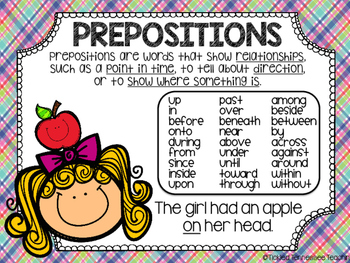
- https://www.teacherspayteachers.com/Product/Prepositions-and-Prepositional-Phrases-FREEBIE-2489946
https://www.istockphoto.com/es/vector/prepositions-de-lugar-coloridos-dibujos-animados-gm467678684-61253974
What Is a Preposition?
“Vampires! Zombies! Werewolves!” “Where?!” “Behind you!”
Thank goodness for prepositions. Imagine not knowing where the danger lay….
Prepositions tell us where or when something is in relation to something else. When monsters are approaching, it’s good to have these special words to tell us where those monsters are. Are they behind us or in front of us? Will they be arriving in three seconds or at midnight?
Prepositions often tell us where one noun is in relation to another (e.g., The coffee ison the table beside you). But they can also indicate more abstract ideas, such as purpose or contrast (e.g., We went for a walk despite the rain).
Types of Prepositions
Prepositions indicate direction, time, location, and spatial relationships, as well as other abstract types of relationships.
Direction: Look to the left and you’ll see our destination.
Time: We’ve been working since this morning.
Location: We saw a movie at the theater.
QUIZ
The script that makes this quiz work was graciously provided by Professor Bradley Kjell of the Computer Science Department at Central Connecticut State University.

